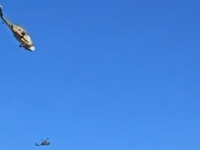Six months after Israel ended its 22-year occupation of southern Lebanon, the region is still desolate. Villages remain half empty, the economy is in a shambles and the fear of violence has returned. That is a far cry from the wild enthusiasm that accompanied the May 24 pullout, which theoretically opened the way for a social and economic revival in a region that for two decades had been the stage for an unrelenting guerrilla war against the Israelis.
There were grand visions of hundreds of thousands of displaced persons returning to rebuild their homes and their lives in the stretch of territory along the border with Israel, of millions of dollars in investment to rebuild roads, bridges, schools and power plants. That has not happened.
Timor Goksul, spokesman for the United Nations Interim Force in Lebanon (UNIFIL), said "there were 90,000 people (living in the region) during the occupation," as opposed to 400,000 previously, "but their numbers have hardly increased. The villages, be they Muslim or Christian, are half empty."
The Greek Catholic bishop of Marjayoun, Antoine Hayek, said that while families have returned to the area, the region has been "emptied of its men, some of them having left for abroad (mostly Israel) and some in prison. The bishop's reference to the absence of men stems, in part, from the fact that many men in southern Lebanon belonged to the pro-Israeli militia, the South Lebanon Army (SLA).
When Israel withdrew from Lebanon, the SLA disintegrated, and an estimated 6,500 former SLA members fled the country for fear of reprisals. Some 1,500 of those men have returned from Israel, while another estimated 200 of them have sought asylum in Germany. Some 2,500 people suspected of collaboration with Israel have been arrested and 1,400 of them have already been convicted and sentenced.
But even for those men who have no cause to fear punishment, there is little to attract them back. UNIFIL's Goksel said that, "For people to come back, the Lebanese government and international donors must invest in public services." That was the idea, but nothing has happened.
In July, a preparatory meeting of the ambassadors of 38 countries and 10 international financial institutions was held in Beirut to discuss giving Lebanon aid to help repair the economic ravages of occupation. At that meeting, then Prime Minister Selim Hoss put the urgent needs of the former occupied zone at $260 million and called for $1.3 billion to develop it over five years. A high-level donors conference was then to have been held in Beirut last month, but was postponed indefinitely.
Behind this was Western annoyance, particularly in the United States, over the Lebanese government's continuing refusal to deploy its own troops along the border with Israel. Lebanon has repeatedly said it will not move its troops to the border until a comprehensive Middle East peace is reached. That would cover not only Israel and the Palestinians, but also Israel and Syria.
Syria, from which Lebanon was carved following World War I, is effectively the overlord of its smaller neighbor and stations 35,000 troops there. While Israeli troops no longer occupy southern Lebanon proper, Beirut claims that the Jewish state continues to hold Lebanese territory — the Farms of Shebaa — which lie in a disputed area at the convergence of the Lebanese, Syrian and Israeli borders.
Lebanon is demanding the return of the Farms and the liberation of 19 Lebanese being held in Israeli prisons. Consequently, UNIFIL peacekeepers and militia of the Shiite fundamentalist group Hezbollah, which spearheaded a guerrilla campaign to drive Israel out, coexist in areas along the border.
But since Hezbollah captured three Israeli soldiers in a commando raid early last month, military tension has ratcheted up. Goksel said the Hezbollah fighters are "very disciplined," but that "small border incidents could expand into a regional crisis" and "no one knows when Israel will lose its patience." — (AFP, Beirut)
by Pascal Mallet
© Agence France Presse 2000
© 2000 Mena Report (www.menareport.com)








